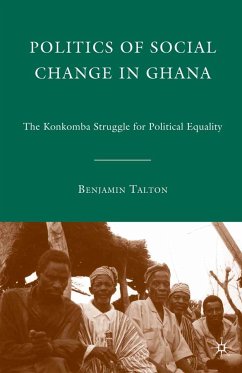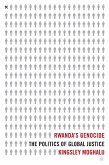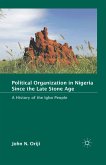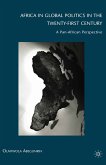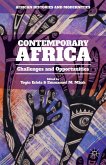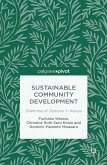Dieser Download kann aus rechtlichen Gründen nur mit Rechnungsadresse in A, B, BG, CY, CZ, D, DK, EW, E, FIN, F, GR, HR, H, IRL, I, LT, L, LR, M, NL, PL, P, R, S, SLO, SK ausgeliefert werden.
"What might a conflict, sparked by the sale of a guinea fowl in a fairly remote corner of Ghana in 1994, tell us about identity and politics in a rapidly globalizing, post-colonial world?Talton s Politics of Social Change in Ghana is one of only a handful of works in African Studies to expertly demonstrate the centrality of the local to understanding power and political consciousness in our globalizing world. It provides fresh insight into debates on tradition, religion, ethnicity, and political mobilization, while making sense of the horrific communal violence that has devastated the social fabric of parts of Northern Ghana for the past three decades." - Jean Allman, J.H. Hexter Professor in the Humanities Washington University in St. Louis
"Taking Africanist history back to its roots, Taltonreminds us that all politics is local andthat ethnicity begins at home." - Gregory Mann, Columbia University
"A very impressive book. With remarkable erudition and felicity, Talton exhibits masterful command of his sources and makes a major contribution to the history of Ghana by exploring through time the delicate relations between the Konkomba and their neighbours. This book fills an important gap in the history of Ghana and with it we are enabled to gain deep insights into the history of the complex ethnic relations in northern Ghana; a history of great importance to Ghana's security and development." - Kofi Baku, University of Ghana.
"Colonial rule in Africa typically left fault lines that have continued to produce political tremors since independence. In the case of Ghana, the north-south divide is starkly apparent, but within the Northern Territories the British also created nested hierarchies. Decentralized peoples like the Konkomba were placed beneath those who had chiefs, with profound implications for land access and the the daily tenor of group relations. The result has beenstruggles that are played not just through acts of violence, but also through discursive claims toautochthony that are designedto trump each other.Benjamin Talton providesa dispassionate and historically-grounded analysis of a kind that has long been overdue. He shows how Konkomba actors sought to forge a common purpose and to contest their marginality, but he also subtly reveals how they were forced to work within the rules of an existing game. There has been a historiographical revolution in writing about Northern Ghana in recent years, and Talton has finally provided the missing piece of the puzzle." - Paul Nugent, Professor of Comparative African History and Director of the Centre of African Studies, University of Edinburgh
"By analyzing the variegated history of relations between the Konkomba, a traditionally chiefless society in Northern Ghana, and politically dominant neighboring chiefdoms, the author offers a stimulating discussion of ethnicity as an instrument of both domination and resistance, and of the ambivalent role of custom , tradition and chieftaincy in a modern African state. He shows that recent violent clashes in Northern Ghana can only be understood when seen in the context of a long history of social change and the political struggle of a marginalized group for political equality and inclusion. The book represents an important contribution to the growing body of studies that from a bottom-up perspective examine African agency under the colonial and post-colonial regimes." - Carola Lentz, Johannes Gutenberg-Universität Mainz

